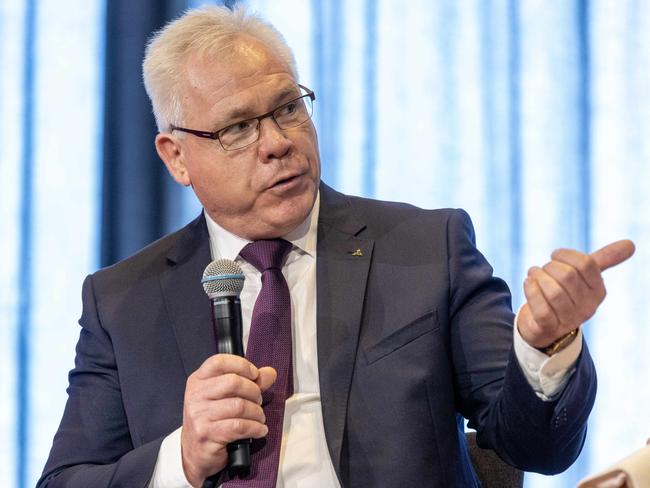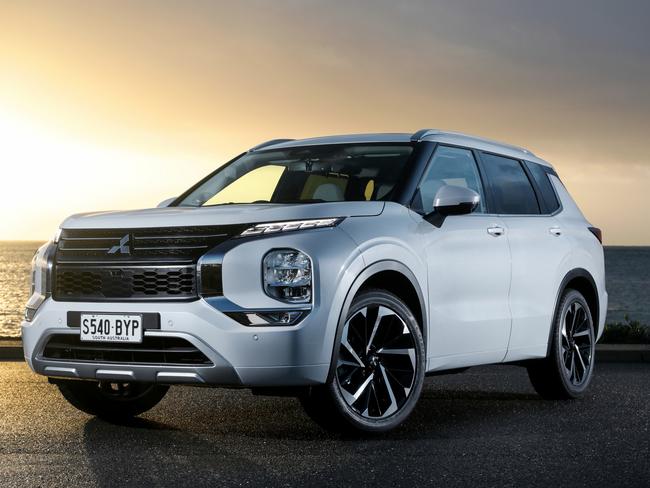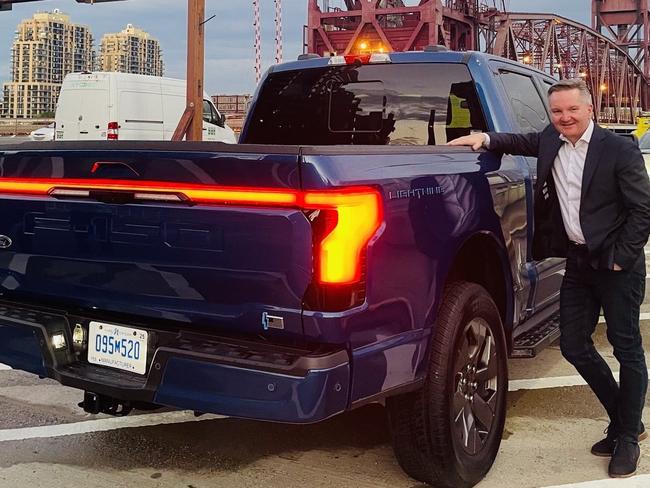‘Has to survive’: Mitsubishi CEO warns prices may have to rise under new emissions standards
The boss of one of Australia’s leading car brands has weighed in on the Albanese government’s proposed new emissions standards.
The boss of Mitsubishi Australia has warned carmakers may have no choice but to raise prices on some of the country’s most popular vehicles under the Albanese government’s proposed new emissions standards.
Mitsubishi Australia chief executive Shaun Westcott said the Japanese manufacturer — which had two of the top 20 most popular vehicles last year with the Outlander SUV and Triton diesel ute — was yet to model the impact of the changes but stressed it was not immune from market forces.
“Mitsubishi does have a portfolio that includes plug-in hybrid models, ASX [compact SUVs] and smaller cars,” he told Drive on Monday.
“And there is opportunity to offset within there. We have a portfolio of cars. We haven’t yet modelled where that falls out and what that means [for meeting the targets].
“We are not a state-subsidised company. We are private industry, which has to survive by making a profit.
“Ultimately, the price of the car will have to cover that equation. And if the current equation doesn’t cover that [profit], then there may have to be an increase in prices of cars somewhere.”
Sean Hanley, vice president of national sales, marketing and franchise operations at Toyota Australia, said the carmarker “supports the introduction of a mandatory fuel-efficiency standard that is ambitious, doesn’t leave Australians behind, is calibrated to the Australian market and allows carmakers to determine the appropriate mix of technologies to achieve it”.
“This will have a direct effect on the vehicles that consumers choose to purchase and drive, encouraging access to vehicles with lower and zero CO2 tailpipe emissions technologies,” he said in a statement to news.com.au.
“Australian consumers have shown they will purchase vehicles that meet their work and lifestyle needs while being practical, capable and affordable — requirements that continue to apply when seeking to reduce their carbon footprint.
“Toyota’s long-term strategy, therefore, involves a multi-pathway approach — delivering a range of technologies that support decarbonisation while leaving no-one behind.
“We welcome the opportunity to review the federal government’s announcement and will carefully consider our response.”
The comments come after the Federal Chamber of Automotive Industries (FCAI) released its own estimates for the impact on prices under the changes slated to come into effect next year.
The industry body crunched the numbers on the carbon penalty that would be incurred under the proposed CO2 targets for the top 20 selling vehicles in Australia in 2023, finding that motorists may be forced to pay as much as $13,000 extra in the first year alone.
Australia’s top-selling car last year, the Ford Ranger, would incur a penalty of $6150 under the proposed 2025 CO2 target and by 2029 the same vehicle — assuming no efficiency improvements in that time — would incur a penalty of $17,950.
The new emissions standards, announced by Energy Minister Chris Bowen and Infrastructure Minister Catherine King earlier this month, do not ban any particular model, but instead penalise car brands if the average emissions of all new vehicles they sell is higher than a cap, which will reduce each year until the end of the decade.

As a result, manufacturers will be forced to sell more zero and low emissions models, or cut back on the sale of popular ute and SUV models, to avoid being hit with fines for breaching the mandatory pollution caps.
The government says that if Australia catches up with the standard in the US by around 2028, Australians stand to save about $1000 per vehicle per year.
Mr Bowen and Ms King have been adamant that the new standards will not affect price or availability.
“It’s not a restriction on what Australians can buy,” Mr Bowen told reporters. “You can still buy a ute, an SUV, whatever you like … In countries with vehicle efficiency standards [like the US and New Zealand], utes and SUVs are often the top-selling car.
“That’s up to Australians, but we’d like to see Australians have more choices within that.”
Asked what the impact would be on “the prices of actual cars”, Ms King said “none”.
“The good thing is that there has been years and years of actual real life experience in countries all around the world,” she said.
“And so the international evidence is that it does not have an impact on price. I have no doubt we are going to hear all sorts of nonsense from the Opposition, from a range of other stakeholders about this.
“We’re going to hear that utes are banned. That is not true … We’re going to hear about price. Again, not true. None of the evidence — there is just no evidence to say that it will affect price at all, SUVS or utes or any other vehicle.”

A spokeswoman for Ms King said on Saturday that the New Vehicle Efficiency Standard “will drive more choices for Australians who want to spend less on fuel”.
“The standard applies to a car maker’s fleet,” she said.
“Debits for those cars which are over the limit can be offset by credits for cars under the limit. A manufacturer can also purchase credits from another car maker which has credits. The impact analysis says the evidence to date consistently finds no purchase price impact, or a negligible purchase price impact, for consumers from the introduction of efficiency standards.”
She added that the government was “engaging closely with vehicle manufacturers throughout the consultation phase on the New Vehicle Efficiency Standard”.
But the car industry, including the FCAI and the Australian Automotive Dealer Association (AADA), has strongly disputed the government’s position.
FCAI chief executive Tony Weber said Mr Bowen was “providing a scenario in which it’s just a win-win” and called on the government to release its own modelling of the likely impact on prices.
“I don’t understand why they won’t release the modelling,” Mr Weber told news.com.au.
“Obviously we hope there are changes to the proposed standards. If it goes through as formulated the impact on consumers will be enormous, particularly in two ways — the increased purchase cost of the vehicle and the availability of product in market segments.”

AADA chief executive James Voortman said while he “shied away” from giving dollar figures, there were a number of brands which only sell diesel and petrol utes and SUVs that would be severely impacted.
“I think these emission standards are just going to be really, really difficult to achieve,” he said.
“We’re asking manufacturers to reduce their emissions by 60 per cent over only five years and if they fail to do that they risk incurring large fines, and those large fines could well end up leading to more expensive vehicles.”
While Mitsubishi is the top seller of fuel-efficient plug-in hybrid cars in Australia, Mr Westcott told Drive it may not be able to sell enough to cancel out its biggest polluters.
But Mr Westcott told the publication Mitsubishi intends to return to the electric vehicle market after axing the i-MiEV a decade ago.
“Every manufacturer is on a journey, we are on that same journey,” he said.
“We have the benefit of being part of an alliance, and through the alliance we have access to, at last count … 35 [electric-car] platforms by the year 2030. So it’s a little bit of an unknown … where [the emissions rules] will fall out [for Mitsubishi Australia in terms of meeting the targets].”
He added that Mitsubishi supported a new emissions standard but one that is “rational, reasonable, logical and achievable”.
Originally published as ‘Has to survive’: Mitsubishi CEO warns prices may have to rise under new emissions standards





